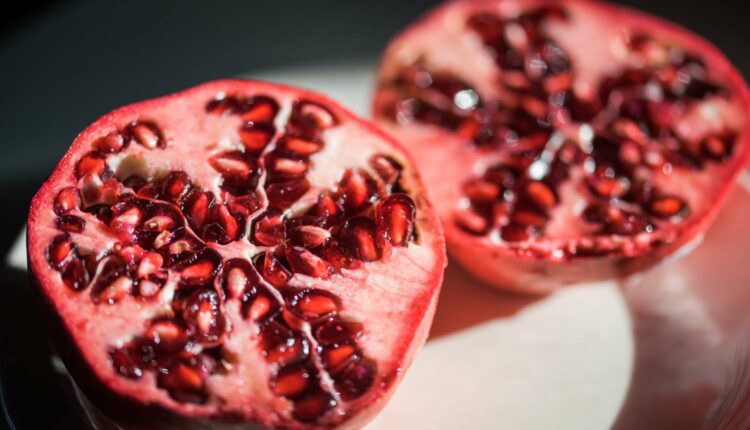©2021 Reporters Post24. All Rights Reserved.
Antioxidants are compounds naturally found in foods, including pomegranates. However, pomegranates aren’t the only source of these essential health-promoting compounds.
Eating a colorful, plant-rich diet ensures you get a mix of antioxidants that work together to support heart, brain, and immune health and longevity.
1. Blueberries
:max_bytes(150000):strip_icc():format(webp)/VWH-GettyImages-2154465508-dc479a2d8d2a41e1b119ea9ff55c6794.jpg)
Blueberries are one of the richest sources of antioxidants, specifically anthocyanins, the pigments that give them their deep blue-purple color. Anthocyanins are linked to better brain function, less inflammation, and a lower risk of heart disease.1
Studies show that regularly eating blueberries can help protect brain cells from oxidative stress (an imbalance of unstable molecules and antioxidants in the body) and may delay age-related cognitive decline.2
2. Blackberries
:max_bytes(150000):strip_icc():format(webp)/VWH-GettyImages-1251383370-cd085206eb364affb852cd8b1c87bbfa.jpg)
Blackberries contain anthocyanins, ellagic acid, and vitamin C, antioxidants that work together to fight oxidative stress. This combination of antioxidants supports a healthy immune system, protects DNA from damage, and contributes to healthy skin and blood vessels.3
Some research shows that blackberries often have an even higher total antioxidant content than blueberries, though both are great to include in your diet.4
3. Walnuts
:max_bytes(150000):strip_icc():format(webp)/VWH-GettyImages-1210590013-3977ff93131245459f25ea9f405696cf.jpg)
Walnuts stand out among nuts for their exceptionally high levels of polyphenols (plant compounds) and vitamin E, antioxidants that protect fats within the body from harmful oxidation.
These omega-3-rich nuts are powerful in reducing inflammation, supporting brain health, and improving blood vessel function.5
4. Dark Chocolate
:max_bytes(150000):strip_icc():format(webp)/Vwh-GettyImages-1445723957-f17e5bd9058b4d5a998dc13512796143.jpg)
Dark chocolate is rich in flavanols, plant compounds that boost circulation, lower blood pressure, and reduce oxidative damage to cholesterol.6
The higher the cocoa content, the more antioxidants dark chocolate contains, especially epicatechin and catechin (also found in green tea).7 Choose minimally processed dark chocolate with at least 70–85% cacao for more antioxidant benefits.
5. Pecans
:max_bytes(150000):strip_icc():format(webp)/VWH-GettyImages-1470138851-7203c1f345f749a290e3f773294100e5.jpg)
Pecans are loaded with polyphenolic compounds, especially ellagic acid and flavonoids, which help neutralize free radicals, unstable molecules that lead to cell damage. They also help protect against low-density lipoprotein (LDL) oxidation, which contributes to the build-up of plaques that block arteries (atherosclerosis).8
Their combination of antioxidants and heart-healthy monounsaturated fats makes pecans an excellent snack.
6. Artichokes
:max_bytes(150000):strip_icc():format(webp)/VWH-GettyImages-707449143-3507566bffe244e8a2bd979946844e01.jpg)
Artichokes are packed with chlorogenic acid, quercetin, and rutin, powerful antioxidants that support your body’s natural detoxification processes and combat inflammation.9
They also contain inulin, a prebiotic fiber that supports a healthy gut microbiome, the community of microbes that live in your digestive tract and support wellness.
7. Cranberries
:max_bytes(150000):strip_icc():format(webp)/VWH-GettyImages-635839482-3624adaa8ff6405fb4015d5544982459.jpg)
Cranberries are especially rich in proanthocyanidins, a unique type of antioxidant that prevents bacteria from sticking around in the urinary tract, thereby reducing infection risk.10
They also contain flavonols and vitamin C, which support immune and cardiovascular health.11 Opt for fresh or lightly sweetened dried cranberries to avoid added sugars that can reduce their benefits.
8. Goji Berries
:max_bytes(150000):strip_icc():format(webp)/VWH-GettyImages-564075527-175c96ae91a74b328ece5bdacf0fdedf.jpg)
Goji berries have a unique bright orange-red color thanks to zeaxanthin and beta-carotene, two antioxidants that protect the eyes and skin from oxidative stress and UV damage. They also contain vitamin C and carbohydrates called polysaccharides with immune-supporting properties.12
9. Kidney Beans
:max_bytes(150000):strip_icc():format(webp)/VWH-GettyImages-1863013813-136429c84bdd457bbc9569eb6c52a1d7.jpg)
Kidney beans provide flavonoids, phenolic acids, and manganese, a mineral with antioxidant activity.13
These compounds help reduce oxidative damage, stabilize blood sugar, and support heart health. As a bonus, the fiber and protein in kidney beans make them a nutrient-dense choice.
10. Green Tea
:max_bytes(150000):strip_icc():format(webp)/VWH-GettyImages-2189728948-14cdf3f1c87b476aab62ac64ee999572.jpg)
Green tea is known for its high concentration of catechins, particularly epigallocatechin gallate (EGCG), which combats inflammation, protects brain cells, and may enhance metabolism and fat oxidation.14
Drinking green tea regularly supports cardiovascular health and may help reduce the risk of certain cancers.15
What Do Antioxidants Do?
Antioxidants help protect your cells from oxidative stress caused by free radicals. You are exposed to free radicals via pollution, ultraviolet (UV) rays, and a poor diet. The body also makes free radicals due to processes like metabolism and inflammation.16
Oxidative stress is linked to chronic conditions like:
- Diabetes
- Heart disease
- Premature aging
Antioxidants work by neutralizing free radicals before they can damage your cells, helping reduce inflammation, support immune function, and keep your body’s systems running smoothly.17
Eating a variety of antioxidant-rich foods, such as fruits, vegetables, nuts, and teas, helps keep your defenses strong and promotes long-term health.


